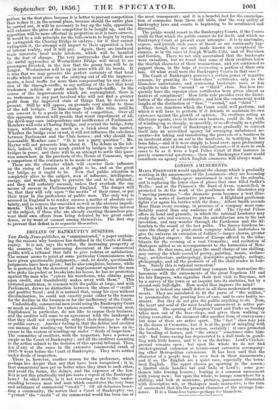DECLINE OF BANKRUPTCY BUSINESS.
THE Daily News publishes, as "communicated," a paper explain- ing the reasons Why business has declined in the Courts of Bank- ruptcy. It is not, says the writer, the increasing prosperity of the country, but the increasing discontent of the commercial public with a tribunal that fails to give redress or satisfaction. The censor seems to point at some particular Commissioners who have given questionable judgments,—and, no doubt, questionable judgments have been given; but he also complains, because, while he is protected by the deterrent of imprisonment against the man who picks his pocket or breaks into his house, he has no protection against the man who " enters his warehouse, who obtains goods upon credit, and fraudulently makes away with them." This irritated gentleman, in common with the public at large, and with Parliament, draws no distinction between the abuse of " credit" and positive fraud ; and it is natural that, using his eyes without discrimination, he could not exactly point either to the reasons for the decline in the business or for the inefficiency of the Court.
Undoubtedly, commercial men avoid using the Bankruptcy Court as much as possible ; but for various reasons. Commercial men, Englishmen in particular, do not like to expose their business ; and the creditor will come to an agreement with the bankrupt so that they shall not reciprocally subject their dealings to official or public survey. Another feeling is, that the debtor and creditor can manage the winding-up better by themselves ; hence an in- crease in the custom of winding-up under " deeds of inspection." The committee of creditors, with the inspectors, have a power as ample as the Court of Bankruptcy ; and all the creditors assenting to the action submit to the decision of this special tribunal. Thus, few if any of the cases in the extensive commercial crash of 1847-'8 went before the Court of Bankruptcy. They were settled under deeds of inspection. There is, however, another reason for the preference, which perhaps lies deeper than any that have been recognized ; it is, that commercial men get on better when they trust to each other, and avoid the forms, the delays, and the expenses of the law. But is not this practically and pro tante a repeal of the Bankrupt- laws ? In other words, is it not reverting so far to the under- standing between man and man which constitutes the very bone and substance of commercial " credit " ? Of all delusions beset-
• ting a community, the notion that a Court of Bankruptcy can "protect" the " credit" of the commercial world has been one of the most transparent ; and it is a hopeful fact for the emancipa- tion of commerce from these old idols, that the very utility of bankruptcy laws and courts is beginning to be scrutinized and discussed.
The public would resort to the Bankruptcy Courts, if the Courts could do that which the public cannot do for itself, and which no Bankruptcy Court at present even attempts : it is to anatomize, expose, and punish such cases of fraud as are continually hap- pening, though they are only made known in exceptional in- stances, as in the cases of Joseph Windle Cole, and of Davidson and Gordon. There we not only ascertained ihat the bankrupts were swindlers, but we found that some of their creditors knew the thiefish character of their transactions, and yet continued to support them, in the hope of recovering a portion of their own loss. Of what avail were the Bankruptcy Courts in that case ?
The Court of Bankruptcy possesses a certain power of negative censure, by granting its "first-class" certificates only to the blameless unfortunate, and sentencing bankrupts more or less culpable to take the " second " or " third" class. But how fre- quently have the superior class certificates been given almost as matters of compliment! How little rule presides over the distri- bution of the classes of certificate; and how the commercial world laughs at the distinction of "first," "second," and " third" ! There are functions which the Court could well perform, and which it will have to perform if it intends to maintain its own existence against the growth of opinion. No creditors acting as dilettante agents, even in their own business, could do the work of winding-up so cheaply, so smoothly, or so effectually as a public, agency. If the Court of Bankruptcy were gradually to convert
i
itself nto an accredited agency for arranging unbalanced ac- counts—for taking and transferring the proceeds of a business in an insolvent state as an aid to the insolvent, in testifying to his bona fides,—and if it were simply to hand over, upon preliminary inspection, cases of fraud to the criminal court,—if it were in such cases to be as it were a legal Police Court of first instance in purely commercial questions —then the Bankruptcy Court would constitute an agency which questions,—then commerce will always want.


























 Previous page
Previous page